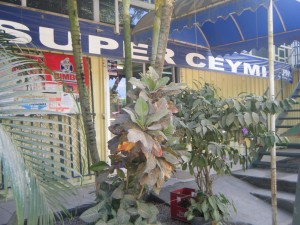
Our three-month stay in Costa Rica ended, and we readied ourselves to return to the United States. It was strange to be leaving the little village we’d tried to adapt ourselves to. It was odd to imagine that in the space of two flights, we would no longer live in the Spanish-speaking world. But we were ready to say goodbye to the bugs, sweat, and daily inconveniences, and come back to the reassurance of familiar places and people in Washington and Oregon.
What did we accomplish in our three-month stay? Roadschooling, unschooling, homeschooling? Yes.
Learning a world language, and getting to speak it? Yes, to a beginner-level degree.
Bonding more as a nuclear family in the absence of neighbors, relatives and playdate pals? Absolutely.
Experiencing a different climate and latitude? Uh-huh.
Gaining a more nuanced understanding of poverty? Oh, hell yes.
Seeing firsthand how women and children closer to the Equator do not get to enjoy the kinds of economic power or rights that many take for granted in wealthier, more northerly lands? You better believe it.
If you ask my children about their time in Central America as unschoolers, you’ll hear this:
We got to see real crocodiles in nature, on a river. We got to go to a big market in Nicaragua where they sold traditional painted masks that were cool. The birds had a lot of colors. We liked getting to go to the local supermercado on our own, and buying Rojo Extreme Bubbaloo. We got to see how the world is different from where we’re from—there’s a lot of poverty there.
We were surrounded by material poverty, but our own rented accommodations had creature comforts such as cable TV and internet access. But without a cell phone, car, bicycle, washing machine, hot water, mail delivery, sidewalks, paved roads, clearly scheduled bus service, public library, bookstore, doctor, pharmacy, or fast food outlet in our area, it was like being sentenced to go backwards in time.
I disliked the reality that if there was going to be a decent meal on our wobbly plastic dining table, I had two choices: either pay gringo prices to get meals from one of the local establishments—offering mostly greasy food to tourists—or pay equally gringo prices at the supermercado for a limited selection of frozen meat and produce that I would then prep and cook on a little gas stovetop.
Our lives in the Pacific Northwest had been a nice combination of healthy, on-the-go meals such as takeout sushi and Burgerville fast food—consumed on our many days doing studio art or swim team in the afternoons—and fun home cooking experiences in a more spacious and better appointed kitchen/dining area, one supplied with a variety of fresh and frozen items from area businesses.
Within a few days of my arrival, it became all too painfully clear that in this Central American village, it falls upon the woman to procure simple ingredients and “clock in” to prepare, serve and clean up after every meal, every day. I felt chained to my tiny kitchen, and limited. Worst of all, fish and shellfish were not for sale anywhere in this supposed fishing village where we lived; there was only the random hope each week of two guys passing by in a pickup truck with frozen shrimp or fish in the back. In three months, I got two frozen herrings from some kind lady on a red ATV who happened to know my Costa Rican neighbor. The running joke was that I’d never get any frozen shrimp from that phantom shrimp truck to make arroz con camarones. And I never did.
How nice it was, then, to come back to the U.S. and walk into Whole Foods to buy an herbal brining kit for the belated Thanksgiving turkey I needed to prepare. And even better, I noticed not one, but two brand new fresh seafood vendors in town.
Women—including busy solo moms like me—get to have consumer choices here that I had to learn to live without in Costa Rica.
Most of the women in the Costa Rican village where we lived are homemakers, though a few have jobs in one of the local supermercados or restaurants. Generally, the Costa Rican wives/mothers there do not have an expectation to work outside the home; they busy themselves with daily cooking, cleaning, laundry, yard care, and childminding, which includes overseeing their kids’ completion of homework. It made me think of the forties and the fifties, only set to the crazy driving thud of reggaetón music from one of the restaurants every third night.
For the boys, a return home means bookstores, the library, and….stuff. We all marveled at our sudden ability to get whatever we needed in five minutes at any Target, Toys “R” Us or Walgreen’s.
While we were out of the country, a new public library opened up in our area of town. So we went to it yesterday and today, to read and work on math problems. And that was where it hit me: There, on a series of shelves, were more Spanish-language titles for children and adults than I’d bet line the shelves of every single Costa Rican home between our village and the town of Tamarindo, a 35-minute drive. That single library branch probably possessed more books, all totaled, than half of Guanacaste province. I was stunned as I sat there in that clean, new building——a building with free services and free admission, free advice, free heating and cooling, free everything save for late fees.
What stunned me was not so much the relative cleanliness, organization and opulence of the place, but something more: that all those women in that little village could probably not even conceive of such a place, a place that would offer them and their children broad access to new ideas and a wealth of knowledge and artistry from around the world. Those women, effectively chained to their kitchens and clotheslines, not to mention their marriages and their traditions, would not even know enough to expect, or (I dare say) demand, that such a facility be made available to their community. Yet it is a standard expectation of people in North America. Even two years after the economy tanked.
We are still overwhelmed by the holiday binge-shopping that surrounds us. We also wonder if it has made all of us more hyper, more stressed, to have so many amenities reappear in our daily lives.
Yet it is wonderfully freeing not to have to escape the heat, and not to have to apply insect repellant. And despite the evils of American consumerism, it is certainly reassuring and uplifting on our return to see shop after shop offering what we need, even if it also offers what so much of what we only think we need.


Thu, Nov 25, 2010
General, International